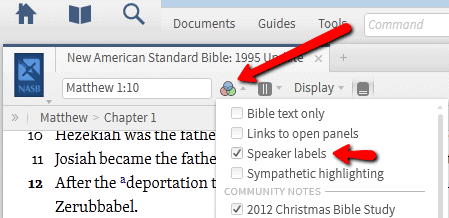Today’s post continues Logos Talk’s Christmas Bible study. Check back throughout December for more ways to study the birth of Jesus!
As he details the birth of Jesus, Matthew references several prophets and prophecies without mentioning their names:
- “Now all this took place to fulfill what was spoken by the Lord through the prophet: ‘behold, the virgin shall be with child . . .’” (Matthew 1:22–23 NASB)
- “for this is what has been written by the prophet: ‘and you, Bethlehem . . .’” (2:5–6)
- “what had been spoken by the Lord through the prophet: ‘out of Egypt I called my son.’” (2:15)
Who are these prophets?
If you’re using Logos 5, finding out is easy: just turn on the speaker labels filter . . .
. . . and see who’s speaking by hovering on the quotation!
And if I click the bullhorn, I can see the Bible Facts entry for that person. Using this tool, it takes seconds to discern the first three unnamed prophets in Matthew’s gospel: Isaiah, Micah, and Hosea, respectively.
But why is this important?
Like Corey said earlier, Matthew has already used God’s history with Israel—his story of redemption—to set the stage for the birth of Jesus. Now let’s see if these prophecies tie into that story.
- Isaiah: Matthew quotes Isaiah 7:14 (NASB), a message the prophet gave Ahaz, king of Judah. Ahaz was afraid that Jerusalem would fall to her enemies and another king would take the throne God promised to David’s family. Isaiah prophecies that Judah’s enemies will fail; then he speaks of Immanuel. God kept his promise: the enemy nations didn’t overthrow Jerusalem. Now, in Matthew, the promise of Immanuel is fulfilled through Jesus, and Ahaz is part of the story (Matthew 1:9 NASB).
- Micah: Matthew quotes one of Isaiah’s contemporaries here. In Micah 5:2 (NASB), the prophet says the Lord will send a “ruler in Israel” from Bethlehem. This would be no ordinary ruler, though: Micah says “his goings forth are from long ago, from the days of eternity,” “he will be great,” and “this one will be our peace.” Again, this isn’t just a sign or prediction; this is God declaring his faithfulness to his people.
- Hosea: the 11th chapter of Hosea gives us a glimpse of God’s indignation and compassion regarding Israel. God says that Israel will fall to the Assyrians (which it did), but promises to bring them back home, and that he “will not destroy [Israel] again.” This prophecy never explicitly mentions the Messiah, but it does promise redemption to Israel.
So, by looking at these prophecies, I learn a few things:
- Understanding Old Testament prophecy helps me understand the New Testament. Each of these snippets that Matthew quotes is a goldmine for understanding God’s relationship to his people.
- God’s relationship and promises to Israel are already important in Matthew. I should keep an eye out for these themes in the rest of the book.
- God keeps his promises. He is faithful and good and mighty and trustworthy. And using Logos 5, I can use each one of these prophecies as an avenue to knowing God better and knowing his word more thoroughly.
You’ll find all the tools we used today in Logos 5. If you haven’t already, upgrade to Logos 5 and join us as we continue our Christmas Bible study.






